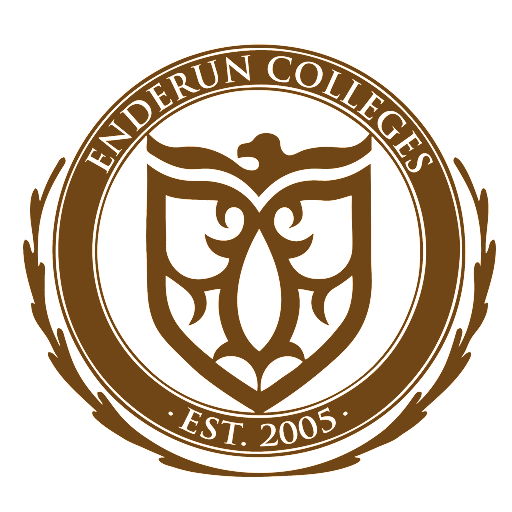

ENDERUN COLLEGES
COVID-19 GUIDELINES & PROTOCOLS
SAFE RETURN TO CAMPUS
(Updated as of January 6, 2022)
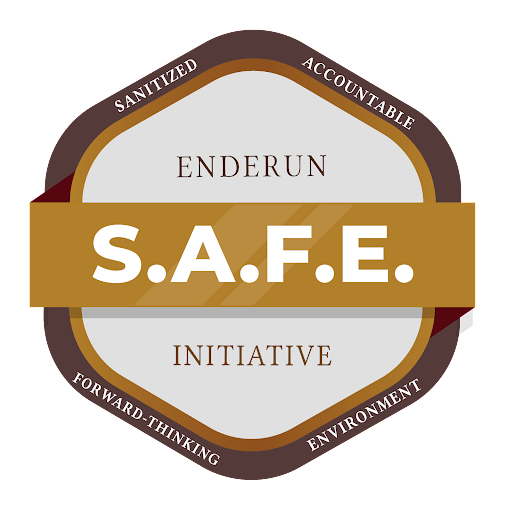
Introduction
On September 28, 2021, only Hospitality/Hotel and Restaurant Management and other degree programs that require hands-on experience have been officially permitted by the Commission on Higher Education (CHED) to begin limited face-to-face classes in higher education institutions (HEIs) under Modified General Community Quarantine (MGCQ). However, it is expected that the other degree programs will also be granted official approval soon.
Enderun Colleges recognizes that a large segment of its students prefer face-to-face interaction with faculty in the classroom setting. In response to this, the school will be implementing hybrid learning. In this mode of delivery, between 65 percent and 100 percent of sessions will be delivered by faculty on campus. Attending sessions on site or remotely is a voluntary preference that has no bearing on one’s academic standing or grade. Classes on campus will begin during the second week of each study period.
As of December 2021, Enderun’s teaching and non-teaching staff have a vaccination rate of 98.2 percent while students in the senior high school and college departments have an 81 percent vaccination rate. Hence, only fully vaccinated students, employees, faculty, guests, and third-party contracts are allowed to report on campus and they must honestly complete the Online Health Declaration/Symptom Monitoring and Screening before coming or arriving at class.
Furthermore, following the General Guidelines issued by CHED, limited face-to-face classes are not mandatory. Only students aged 20 years old and above will be permitted to take the limited face-to-face classes. Students are also required to submit a Philhealth form (MDR) or equivalent medical insurance that covers medical expenses related to COVID-19.
At the start of the Second Semester of SY 2021-2022, the teachers of hybrid classes will discuss the schedule of face-to-face classes and determine if groupings will have to be made based on the number of students interested to go to the campus and the limited capacity of the rooms. Students who will do face-to-face will have a fixed schedule spread throughout the study period. The College dormitory will be opened to students who are eligible to attend the limited face-to-face classes. The same school guidelines and protocols will strictly be implemented in the dorm.
Enderun has strictly modified requirements for individuals present on campus to mitigate the public health risks and reduce the spread of the coronavirus associated with COVID-19. All faculty, staff, students, and third-party contract workers must comply with these requirements while present on site. Non-compliant reports will be addressed per the Enderun procedures accordingly.
I. COVID-19 BASICS
A. Must Know
TRANSMISSION
- The virus is primarily spread through respiratory DROPLETS when an infected person speaks, coughs, or sneezes.
- Transmission can also happen through contact with FOMITES that can enter the mouths, eyes or noses of people. These may also infect surfaces up to one (1) meter away and can survive for at least three (3) days depending on the material.
- The World Health Organization recently added AIRBORNE transmission via micro-droplet suspension as one of the modes of transmission of COVID-19. Studies reveal that airborne transmission may be possible in healthcare settings, during aerosol-generating procedures (i.e. nebulization, cardiopulmonary resuscitation, endotracheal intubation, suctioning of secretions, etc.), and in small, closed, and confined spaces with little or no ventilation.
SYMPTOMS AND INCUBATION
Symptoms can take UP TO 14 DAYS from infection to show.
The most COMMON SYMPTOMS are:
- Fever (not necessarily high fever)
- Dry cough
- Tiredness or fatigue
- Shortness of breath or difficulty breathing
Patients may, likewise, experience other non-specific symptoms such as sore throat, nasal congestion, headache, diarrhea, nausea and vomiting, and loss of smell (anosmia) or loss of taste (ageusia) preceding the onset of respiratory symptoms.
SEVERE SYMPTOMS include:
- Difficulty breathing or breathlessness while speaking
- Constant pain or pressure in the chest
- Paleness or cold and clammy skin
- Confusion, changes in mental state or unresponsiveness
Some people are ASYMPTOMATIC (an absence of symptoms), but they are infected and can transmit the virus.
MOST-AT-RISK POPULATION (MARP)
People of all ages can catch COVID-19. People at risk of SEVERE ILLNESS if they catch the virus are the following:
- Elderly (60 years of age and older)
- Persons with pre-existing medical conditions (heart/lung disease, diabetes, asthma, etc.)
- Smokers
- Women with high-risk pregnancies (aged 17 or younger, 35 or older, those with pre-existing conditions)
- Immunocompromised patients as assessed by an attending physician (e.g. on chemotherapy for cancer, untreated HIV infection, combined immunodeficiency disorder, taking steroids for more than 14 days, etc.)
DELTA VARIANT
The Delta variant causes more infections and spreads faster than earlier forms of the virus that causes COVID-19. It might cause more severe illness than previous strains in unvaccinated people.
- Vaccines continue to reduce a person’s risk of contracting the virus that causes COVID-19, including this variant.
- Vaccines continue to be highly effective at preventing hospitalization and death, including against this variant.
- Fully vaccinated people with breakthrough infections from this variant appear to be infectious for a shorter period.
- Get vaccinated and wear masks indoors in public spaces to reduce the spread of this variant.
OMICRON VARIANT
The Omicron coronavirus variant is more transmissible than the Delta strain and reduces vaccine efficacy, but may cause less severe symptoms according to early data from the World Health Organization (WHO).
COVID-19 VACCINES
COVID-19 vaccines are effective in protecting you from getting sick. According to information from the World Health Organization (WHO), people who have been fully vaccinated may return to some of their pre-pandemic activities such as exercising in public or attending classes.
Benefits of Getting a COVID-19 Vaccine
COVID-19 vaccines are safe
- While COVID-19 vaccines were developed rapidly, all steps have been taken to ensure their safety and effectiveness.
- COVID-19 vaccines were developed using science that has been around for decades.
- COVID-19 vaccines are not experimental. They went through all the required stages of clinical trials. Extensive testing and monitoring have shown that these vaccines are safe and effective.
- COVID-19 vaccines have received and continue to undergo the most intensive safety monitoring history.
COVID-19 vaccines are effective
- COVID 19-vaccines are effective. They significantly reduce your risk of getting and spreading the virus that causes COVID-19. Learn more about the different COVID-19 vaccines.
- COVID-19 vaccines also help keep you from getting seriously ill even if you do get COVID-19.
- Getting vaccinated yourself may also protect people around you, particularly people at increased risk for severe illness from COVID-19.
Once you are fully vaccinated, you can start doing more
- After you are fully vaccinated for COVID-19, you may resume many activities that you did before the pandemic.
- WHO recommends that fully vaccinated people wear a mask in public indoor settings if they are in an area of substantial or high transmission.
- Fully vaccinated people might choose to wear a mask regardless of the level of transmission, particularly if they or someone in their household is immunocompromised or at increased risk for severe disease, or if someone in their household is unvaccinated. People who are at increased risk for severe disease include older adults and those who have certain medical conditions, such as diabetes, overweight or obesity, and heart conditions.
- People are not considered fully vaccinated until 2 weeks after their second dose of the Pfizer-BioNTech, Moderna or Sinovac COVID-19 vaccine, or 2 weeks after a single-dose of Johnson & Johnson’s Janssen COVID-19 vaccine. You should keep using all the tools available to protect yourself and others until you are considered fully vaccinated.
- Learn more about COVID-19 vaccination for people with underlying medical conditions or weakened immune systems.
COVID-19 vaccination is a safer way to help build protection
- Get vaccinated regardless of whether you already had COVID-19. Evidence is emerging that people get better protection by being fully vaccinated compared with having had COVID-19. One study showed that unvaccinated people who already had COVID-19 are more than 2 times as likely than fully vaccinated people to get COVID-19 again.
- Learn more about the clinical considerations for people who were treated for COVID-19 with monoclonal antibodies or convalescent plasma, or history of multisystem inflammatory syndrome in adults or children (MIS-A or MIS-C).
- COVID-19 is still a threat to people who are unvaccinated. Some people who get COVID-19 can become severely ill, which could result in hospitalization, and some people have ongoing health problems several weeks or even longer after getting infected. Even people who did not have symptoms when they were infected can have these ongoing health problems.
Immunity after COVID-19 vaccination
- There is still a lot we are learning about COVID-19 vaccines and WHO is constantly reviewing evidence and updating guidance. We don’t know how long protection lasts for those who are vaccinated.
- What we do know is that COVID-19 has caused very serious illness and death for a lot of people.
- If you get COVID-19, you also risk giving it to loved ones who may get very sick. Getting a COVID-19 vaccine is a safer choice.
None of the COVID-19 vaccines can make you sick with COVID-19
None of the COVID-19 vaccines contain the live virus that causes COVID-19. This means that the COVID-19 vaccine cannot make you sick with COVID-19. Learn more Facts about COVID-19 Vaccines.
DEFINITION OF TERMS
Gradual Reopening
- It pertains to progressive reopening of campus/es of HEIs for limited face-to-face classes. The reopening shall be done by considering the following:
Community quarantine status or health situation of localities of HEIs - Priority degree program/s
- Nature of subjects/courses under the specified priority programs
Retrofitting
Retrofitting means making changes to the facilities of HEIs to ensure the health and safety of students, faculty, and staff while inside the campuses during the COVID-19 pandemic. Examples of these changes are putting up safety barriers, posting signages, rearranging rooms/communal areas, etc.
Face-to-Face Classes
It is a teaching-learning environment wherein both faculty/instructor and students are physically present in one room/facility at the same time.
Limited Face-to-Face Classes
It is restricting the number of students to attend face-to-face classes in campus on any given day based on the degree programs or courses they are enrolled in, cyclical student shifting/rotating schedule, and physical distancing and other health and safety protocols.
Hybrid Class
A hybrid class is a combination of face-to-face and online class. It will be attended simultaneously (synchronously) by a limited number of students who opt to participate in class at campus and the rest who will participate from home.
II. GOALS
- Safety and protection of the Enderun community (students, employees, guests, clients) against COVID-19 virus
- Gain assurance and peace of mind of the community that they are cared for at these times by providing facilities and practices that minimize their exposure to COVID-19 virus
- Communicate to public our preparedness for the new normal
- Compliance with the LGU, DOLE/DTI, DOH/WHO, DEPED, CHED, IATF measures
- Reach herd immunity within the Enderun Community via its vaccination program
III. ENDERUN PREVENTION PROGRAMS
In accordance with the easing of government orders, Enderun Colleges has also modified requirements for individuals present at Enderun Colleges properties to mitigate the public health risks and reduce the spread of the coronavirus associated with COVID-19. The requirements set forth below summarize Enderun Colleges’ COVID-19 protocols, requirements and guidelines, which can be found at the Enderun COVID-19 Website and Enderun App Channel. Periodic modifications to this document may be required to comply with changing public health conditions and the corresponding IATF and Department of Health Orders and World Health Organization guidance, and those mandated under the Department of Education (DepEd) and Commission on Higher Education (CHED).
All faculty, staff, students, and third-party contract workers must comply with these requirements while present on the Enderun campus or properties (collectively “campus”). Non-compliant reports will be addressed per the Enderun procedures accordingly.
NEW STANDARD APPROACH AT ENDERUN COLLEGES
- High-Touch, Deep Clean Areas: Rigorous disinfection of the most frequently touched areas – light switches, door handles, AC remotes, classroom tables and chairs, lockers, handrails, computer keyboards and mouse in computer labs.
- Paperless Transactions: All forms online with digitized approval process. QR coded Health Declaration Checklist.
- Clean and Clean Again: Increase the frequency of cleaning common areas, including restrooms. All surfaces to be thoroughly cleaned with hospital-grade disinfectants.
- Accessible Disinfecting Hand Sanitizers: Provide stations at primary entrances and key high traffic areas, for instance, a station to allow students, employees, and guests to sanitize regularly.
- Cashless Payment System: Encourage use of GCASH to the Enderun community and other cashless payment systems at all cashiering areas of the school.
- Person-to-Person Contact: To help alleviate the risk of COVID-19 transmission through human contact, there will be a rearranging of classrooms and office furniture with strict physical distancing measures and a strict limit to the number of people in a room at one time.
- Communication: Enhanced communication efforts through proper signages installed at areas in the campus. Detailed information disseminated through emails, class lectures, and talks.
- Food Safety: Enhance sanitation guidelines on safe food preparation and service practices for food handlers.
- Appropriate PPE: Issuance of appropriate personal protective equipment as per function
- Contact Tracing: Enderun contact tracing process with compliance to DOH contact tracing guidelines.
Vaccination awareness to reach herd immunity in the community
CAMPUS PROTOCOLS
I. SCREENING
All fully vaccinated students, employees, faculty, guests, and third-party contracts must honestly complete the Online Health Declaration / Symptom Monitoring and Screening before coming to campus or arriving at class.

The brief form can be filled out on a smartphone. Alternatively, this can now be accessed through the Enderun Mobile app, which is now available on the App Store and the Google Play Store.
Hybrid faculty: faculty working a hybrid schedule should complete the survey only on the days when they will be working in person.
Invited guests and third-party contractors: All guests, vendors, third-party contract workers, external parties, and other invited guests must complete the survey before coming to campus.
IMPORTANT:
- Answer all survey questions as honestly and accurately as possible.
- If a certificate of clearance is issued by the Enderun Health Services (EHS), have it available either electronically or in a printout, to show throughout the day as may be required for entry into various campus locations.
- If clearance is denied, follow instructions as prompted by EHS and do not come to campus until cleared to do so.
- Do NOT come to campus for any purpose if sick or symptoms are present.
- Do NOT come to campus if exposed to someone with COVID-19 until clearance is obtained.
- Supervisors of staff, and department heads, must check with EHS their direct reports are cleared to be onsite at Enderun campus. Any employee who has not completed the health screening process must be advised to do so immediately in order to remain on site. Any employee who has completed the health screening process but has received a status of “not cleared” must be instructed to contact the EHS immediately for instructions. If the employee refuses to comply with any of these directives, they will not be allowed on-site until requirements are met and the supervisor may need to engage with Employee Services for the appropriate next steps.
Comply with on-site temperature checks (where applicable)
- Participate in temperature screening as required at campus facilities.
- Follow instruction if not cleared to enter the facility.
The following are guiding principles for illnesses and screening on campus:
- Students and employees should stay home if sick, if a household member is experiencing COVID-19 symptoms, or diagnosed with COVID- 19 (regardless of vaccination status).
- All students and employees must be prepared to isolate or quarantine when necessary.
- Individuals who are fully vaccinated (2 weeks after last COVID vaccine dose) and/or had a previous COVID positive within the last 90 days, are not required to quarantine, but should self-monitor and get tested 3-5 days after last exposure. If symptoms develop, get retested. If positive, isolate for 10 days.
- Individuals who are unvaccinated/partially vaccinated and/or had a previous COVID positive greater than 90 days ago, should quarantine for 10 days from the date of last exposure to positive person. Get tested 3-5 days after last exposure. (*May test out early after 7 days of quarantine with a negative COVID swab collected after day #5.) If symptoms develop, get retested. If positive, isolate for 10 days.
- If COVID positive, regardless of vaccination status, the individual will need to isolate themself for 10 days.
- Everyone must be prepared to participate in any case investigation and contact tracing.
- All students and employees must self-monitor health for symptoms of COVID-19 using the self- assessment protocol of Enderun Colleges.
- All students and employees should immediately notify the Office of Health Services when sick with COVID-19 and provide the list of their close contacts in Enderun to be prepared for future for proper contact tracing.
-
- Note: Close contacts are defined as people you have been 1 meter for at least 15 minutes within the 48 hours before symptom onset until they meet criteria for discontinuing home isolation.
- Employees will be expected to consult with their supervisor and Employee Services regarding COVID-19 related sick leave/time off.
II. DETECTION
The following individuals are NOT ALLOWED to Enter the Campus:
- SYMPTOMATIC & NOT VACCINATED INDIVIDUALS
- Students and employees who are not fully vaccinated
- Students and employees who are sick should not attend work/school in-person
- Self-isolate or just stay at home and do not go to school if you are exhibiting COVID-19-like symptoms
- Fever or chills
- Cough
- Shortness of breath or difficulty breathing
- Fatigue
- Muscle or body aches
- Headache
- New loss of taste or smell
- Sore throat
- Congestion or runny nose
- Nausea or vomiting
- Diarrhea
- DIRECT EXPOSURE WITH COVID 19 POSITIVE PATIENT/S (regardless if asymptomatic)
Symptoms of COVID-19
People with COVID-19 have a wide range of reported symptoms – from mild symptoms to severe illness. Symptoms may appear 2-14 days after exposure to the virus that causes COVID-19.
Symptoms include, but are not limited to:
III. CONTAINMENT
Should one become sick on campus
– Proceed to the Clinic Isolation Room immediately for assessment by the School Nurse
– Conduct Antigen testing
– If negative antigen test: arrangements will be made by the School Nurse for students and employees to go home and rest.
– If positive antigen test: parents and/or legal guardian of student will be contacted to report the status of the student. Student will then be brought to the nearest hospital for further medical attention and an RT-PCR test. For employees, they will also be advised to seek further medical consultation
– For minor students, parents or guardian must pick up the student
– While the RT-PCR test result is not yet available, the Health & Safety Committee will conduct contact tracing and inform the close contacts to self-monitor for potential symptoms. Proper monitoring will be provided by the Nurse
POSITIVE CASE AND ISOLATION
Students, faculty, staff and students who test positive for COVID-19 should isolate at their home for the 10-day isolation period. They should follow the case management program as instructed by Enderun Office of Health Services or their primary care provider.
DISCONTINUING ISOLATION
Persons who have tested positive for COVID-19 and have stayed home (home isolated) may leave home isolation after meeting all three of these criteria:
- No fever (temperature >100.4° F) for at least 48 hours (no fever without the use of a medicine that reduces fevers such as Tylenol or Ibuprofen); AND
- Other symptoms have improved (for example, cough or shortness of breath have improved); AND
- At least 10 days have passed since symptoms first appeared.
Persons who have tested positive for COVID-19 but did not have COVID-19 symptoms and have stayed home (home isolated) may leave home after meeting these two criteria:
- At least 10 days have passed since the date of the positive test; AND
- Continue to have no symptoms (no cough, fever or shortness of breath) since the test.
IV. CAMPUS LOCKDOWN
For Positive RT-PCR test
– All close contacts will be advised to stay home, not go to campus, do quarantine for 10 days, and observe for possible symptoms
– When close contact experience symptoms, he/she will also be advised to seek medical attention and do RT-PCR test
– The building will be closed immediately for 24 hours for deep cleaning and disinfection
– No one will be allowed to enter the building unless advised that it is already safe to enter
– Patients must provide an RT-PCR test to the Clinic
– Patients must seek Medical Clearance from their attending physician
– Clinic will conduct further assessment
– Once cleared, Clinic will issue a Fit to Return to Class Form
– Submit the Fit to Return to Class Form to your instructor to allow entry to class
– Close contacts with no symptoms may resume work or F2F classes
For Negative RT-PCR test
Work and classes may resume as scheduled
V. HYGIENE HABITS
- Everyone must wear a mask
- All individuals are required to wear face masks while inside the campus, in all indoor spaces, including classrooms, teaching labs, libraries, indoor facilities, and recreation spaces.
- Wearing of masks is also required in all indoor workspaces, including offices, except when one is alone in an office with the door closed.
- Face masks are recommended while in personal indoor living spaces if people are in the presence of individuals from outside their immediate household.
- The appropriate face masks must be worn properly over the nose, mouth and chin. A face mask does not include a scarf, ski mask, balaclava, bandana, turtleneck, collar, or single layer of fabric.
- Bring personal sanitation kits
- Use personal pens and laptops
- Observe proper hand washing and sanitize hands regularly with alcohol
- Conduct proper respiratory and coughing etiquette
- Observe restroom etiquette
VI. SAFE DISTANCING GUIDELINES
Enderun Colleges adheres to standards set by the World Health Organization and other government mandated guidelines in the use of space and conduct of activities and events.
Maintaining space between yourself and others is a best practice and is one of the best tools to avoid exposure to the COVID-19 virus. People can spread the virus without being sick or knowing they are sick, so it is important to maintain social distance from others whenever possible. Physical distancing of at least 1 meter is required on Enderun Colleges campus and in satellite locations to limit exposure to the COVID-19 virus and slow its spread.
- Campus Signages
- Everyone on campus follows these physical distancing practices:
- Stay at least 1 meter from others (about an arms’ length) at all times.
- All workstations will be oriented to a minimum of 1.5 meters apart in all directions.
- Meetings will take place online instead of a conference room. If departments must meet in person, they will be instructed to wipe down surfaces, chairs and equipment after each use, and maintain a physical distance of at least 1 meter.
- Common areas on campus such as lounges will be rearranged to maintain physical distancing.
- Students and employees will not be allowed to loiter and will be instructed to minimize non-essential movement around campus. If duties require movement to other areas on campus, practice physical distancing and follow all health and safety guidelines for those locations.
- No gathering in groups larger than the size allowable by the IATF & DOH.
- Handshaking and other forms of physical contact are discouraged.
- Dealing with Violations of Health and Safety Guidelines
To help the campus community navigate health and safety regulations related to working, teaching and learning, Enderun has installed relevant signages and messaging in most common and public areas
All members of the Enderun community should enforce physical distancing protocols in common areas and places where individuals are likely to interact. Supervisors will be expected to ensure employees self-enforce physical distancing protocols in all areas.
There will be marshals around the campus to inspect classrooms, offices, and common areas to enforce physical distancing at all times.
Enderun Colleges is focused on developing a collaborative community of compliance to help reduce the spread of COVID-19. Supervisors and Department Heads should remind their employees to complete the daily Health Declaration Survey, to wear masks at all times in the office, and to follow other campus protocols.
There may be times when employees, after being reminded, refuse to comply with campus health and safety protocols. If employees demonstrate repeated noncompliance with protocols, a complaint can be made to the employee’s supervisor or to the Employee Services Department.
A determination will be made whether an employee’s violation was willful or not. Employees with willful violations, repeated violations or violations believed to have resulted in COVID-infections will face disciplinary measures up to and including exclusion from campus.
Sample Classroom and Office Occupancy Capacity
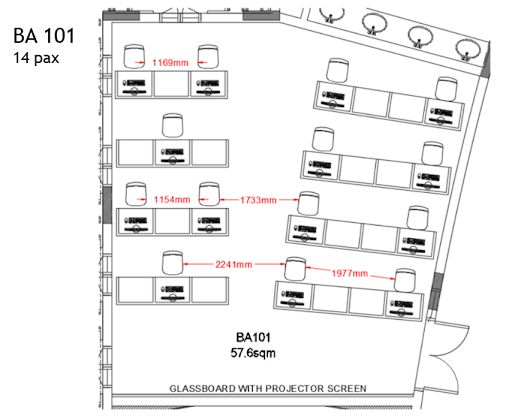
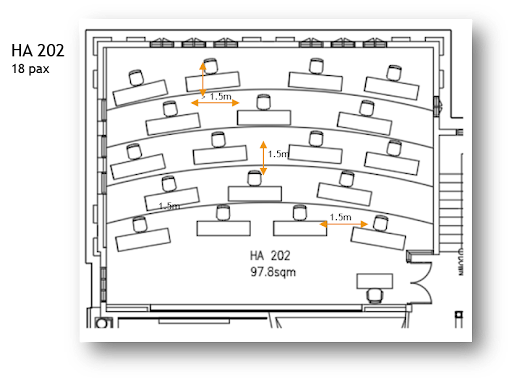
VII. COVID-19 TESTING
Faculty, staff and students may be directed to do RT-PCR test if they are experiencing symptoms of COVID-19, if they have been in close contact with an individual who has tested positive or if changing conditions warrant additional surveillance.
VIII. ISOLATION, QUARANTINE, AND CONTACT TRACING
To protect the health of both infected individuals and the rest of the Enderun community, isolation, contact tracing, and quarantine protocols are in place. The guidelines will be executed by the Enderun Office of Health Services and the Enderun Crisis Management Committee, following the DOH and IATF guidelines and protocols.
Isolation
Members of the Enderun community who test positive for COVID-19 or who are symptomatic and awaiting test results will be required to isolate at home. Individuals who are self-isolating cannot have visitors and should only leave their isolation location to receive medical care.
For those who test positive, the isolation period typically lasts 14 days from the date of the positive test or the onset of symptoms, although it can extend longer if the person has a severe infection or is immunocompromised.
Contact tracing
When a student or faculty or staff member tests positive, Enderun will perform a case investigation and contact tracing, identifying, and notifying all individuals considered to be close contacts of the infected person — meaning they were within 1 meter of the person for more than 15 minutes over a 24-hour period. These close contacts will then be instructed on whether they need to test and/or quarantine.
Quarantine
Quarantine is often necessary for individuals who self-identify or have been identified by Enderun contact tracers as having been in close contact with an infected person but who have not themselves tested positive for COVID-19. Currently, full quarantine procedures are in place for students, faculty and staff who are not fully vaccinated.
As with isolation, individuals will generally remain in quarantine for up to 10 days from their last contact with an infected person (and will be required to monitor their symptoms for up to 14 days).
Fully vaccinated, asymptomatic students
Fully vaccinated students — those who are at least two weeks past the final dose of a two-dose COVID-19 vaccine or two weeks past the single-dose Johnson & Johnson vaccine — who have been in close contact with an infected person but are asymptomatic will need to adhere to a quarantine order.
Under this plan, they will take a COVID-19 test five days following their exposure to an infected person. While awaiting the results, they will be required to:
- Remain in their residence, whether on or off campus, and attend class remotely.
- Refrain from participating in social activities or gatherings (including sporting events and practices), either indoors or outdoors, on or off campus.
- Refrain from entering settings such as restaurants, bars, markets or offices.
- Students attending sessions in campus are expected to:
- Adhere to health protocols.
- Bring a laptop, tablet or similar device in the event their teacher needs them to collaborate with students attending remotely via the Enderun Learning Management System.
- Wear the official Enderun wash day uniform.
- Classes on campus will begin during the second week of each study period. Faculty should cascade the following during the first week of the study period:
- Schedule of synchronous sessions for the entire study period, and which of these sessions will be conducted on campus
- Topic assignment/coverage for each synchronous session
- Procedure to reserve a seat on campus for the class
- Reminders on health protocol for students reporting to campus
- Class-specific instructions or requirements for students reporting to campus
- Similar to the policy with the online mode of delivery, attendance will be checked.
- The class syllabus, handouts, and lecture materials will be posted in the class’ Enderun Learning Management System site. Lecture materials will be organized by module.
- Faculty will continue to record sessions for the reference of students who may have missed class or those with intermittent internet connections.
- Given that students may encounter intermittent issues with connectivity, faculty are advised to include a buffer or implicit extension when determining the deadline for submitting requirements and assessments. Penalties apply for submissions that are turned in after the set deadline.
- Similar to the policy in a traditional face-to-face class, faculty will provide an alternate or make-up activity for students who were not able to participate in agreed assessment due to a valid reason.
If the post-exposure COVID-19 test comes back negative, students will be released from quarantine; if positive, they will be required to isolate. Students who decline to test must adhere to quarantine for 14 days after their date of exposure.
Employees: Faculty and staff who have been in close contact with an infected person must adhere to quarantine procedures even if they were fully vaccinated at the time of their exposure and have no COVID-19 symptoms. They must monitor their health and symptoms for 14 days following the exposure and strictly adhere to wearing masks at all times.
Students: Those identified as close contacts of an infected person who are asymptomatic and who have recovered from a confirmed case of COVID-19 in the previous 90 days are also required to monitor their symptoms for 14 days and strictly adhere to always wearing masks.
IX. HYBRID MODE OF DELIVERY
The school acknowledges the preference of a large segment of its students for face-to-face interaction with faculty in the classroom setting. In this mode of delivery, between 65% to 100% sessions will be delivered by faculty on campus.
The choice of attending sessions on campus or remotely is a matter of preference and will not directly affect one’s standing or grade in class. Mounted cameras in the classroom coupled with Google Meet or Zoom instances embedded within the Enderun Learning Management System should allow for the seamless interaction between faculty on campus, students in campus as well as students participating remotely. By default, submission of deliverables will be via the Enderun Learning Management System to accommodate students who are participating remotely—though faculty may also allow students attending on campus to hand in their work in person.
X. KEY CLASS POLICIES IN BLENDED MODE OF DELIVERY
In the event that the health situation worsens, the government and/or the school may decide to cancel all in-campus sessions. As such, hybrid classes will automatically revert to online mode.
ENDERUN COVID-19 DIRECTORY
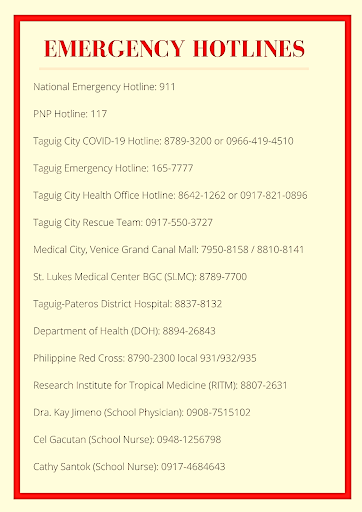
APPENDIX B:
Concierge: Main entrance for all students and employees. Area for the mandatory Health Screening.
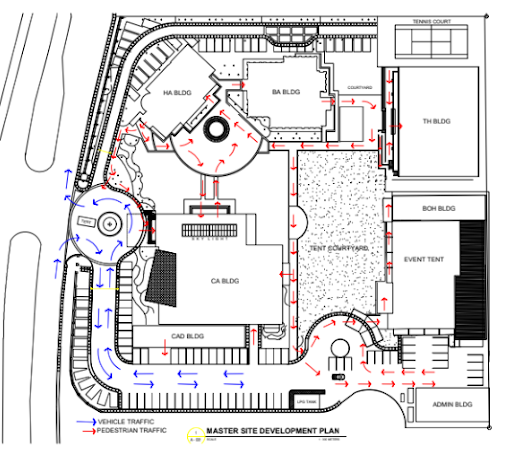
CONTACT TRACING PROCESS FLOW CHART
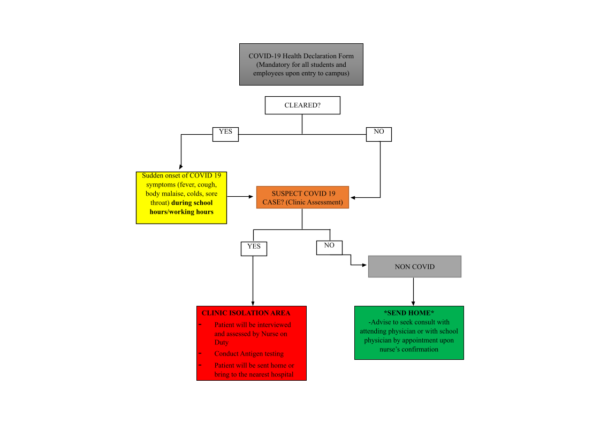
AT THE CLINIC ISOLATION AREA
- Conduct antigen testing
- Regardless of the result of the Antigen testing:
Students:
- School Nurse will contact parents/legal guardian and inform status of student
- Send home or bring to the nearest hospital, depending on the student and/or parents’ preference.
- Advise to do RT-PCR Swab Test and submit result to the Clinic
Employees:
- Will be sent home or brought to the nearest hospital, depending on the employee’s preference.
- Advise to do RT-PCR Swab Test and submit result to the Clinic
Health Services Team:
- Will initiate Contact Tracing Guidelines
- During the contact tracing process, the building where the Probable COVID19 patient stayed may only be opened 24 hours after the disinfection process
- Once patient is cleared, may proceed with back to campus clearance process
CONTACT TRACING GUIDELINES
- Initiation of Contact Tracing
- When was the last time the patient visited the Enderun Facility?
- When did the onset of symptoms start?
- What were the symptoms?
- Did the patient wear a mask inside the Enderun Facility? What type of mask?
- Did the patient have close contact with anybody at all that is less than 2 meters apart?
- Did the patient practice good hand hygiene (handwashing, sanitizing, and disinfecting at all times?) while inside the Enderun Facility?
- List of all the close contact patients had while inside the Enderun Facility.
- Close Contact List
- Contact listing or Recording Efforts should be made to identify every listed contact and to inform them of their monitoring status, what it means, the actions that will follow, and the importance of receiving early care if they develop symptoms.
- Contacts should also be provided with information about the prevention of the disease. In some cases, quarantine or isolation is required for high-risk contacts, either at home or in the hospital.
- Close Contacts should observe self for symptoms until swab results of Probable COVID19 Patient is released
- Management
- For close contact monitoring of Category C individuals, a daily log sheet should be provided, which includes signs and symptoms checklist. Temperature should be checked twice a day and will be logged also for 14 days, starting day 0 as the exposure date to the infected individual. Should signs and symptoms be present, seek further medical consultation and request for RT-PCR swab testing.
- Daily follow-up should be conducted with all close contacts to monitor for signs and symptoms of infection.
- Recording and Reporting
Confirmed COVID-19 Patients (through RT -PCR swab test), should have close contacts identified by asking the following set of questions:
CLOSE CONTACT INVESTIGATION
All close contact should be listed in the Close Contact List Form. Each close contact shall have an individual Signs and Symptoms log form for monitoring and shall be updated daily for consolidation as mentioned. This should be kept in a logbook for future reference.
CONTACT TRACING PROCESS FOR CONFIRMED COVID-19 CASE
- When was the last time the patient visited the Enderun Facility?
- When did the onset of symptoms start?
- What were the symptoms?
- Did the patient wear the required PPE like face mask and face shield inside the Enderun Facility? What type of face mask?
- Did the patient have close contact with anybody at all that is less than 2 meters apart?
- Did the patient practice good hand hygiene (handwashing, sanitizing and disinfecting at all times?) while inside the Enderun Facility?
- List of all the close contact the patient had while inside Enderun Facility.
- informed of their status, explain as to why they are considered close contact,
- advised to self-quarantine and isolate at home for 14 days if asymptomatic,
- instructed take Vit. C with Zinc 500mg twice a day for 14 days,
- provided with the Symptom Log Sheet,
- monitored daily for 14 days for occurrence of symptoms, should SYMPTOMS DEVELOP, report to the School Physician and ACTIVATE PROBABLE COVID-19 PROTOCOL
- The School Nurse should inform the School Physician of the employee/student’s status and regularly update patient records. For privacy concerns, the School Nurse and School Physician may directly coordinate with the students and/or parents.
- INITIATE Sanitation and Disinfection protocol (by Facilities and Maintenance Department) insert protocol as additional Annex
- After 10 days quarantine/isolation, the patient is required to secure MEDICAL CERTIFICATE from the School Physician or from a preferred Attending Physician, with lab results as supporting documents.
Close contacts are to be:
APPENDIX D:
DOH Close Contact Line List Form
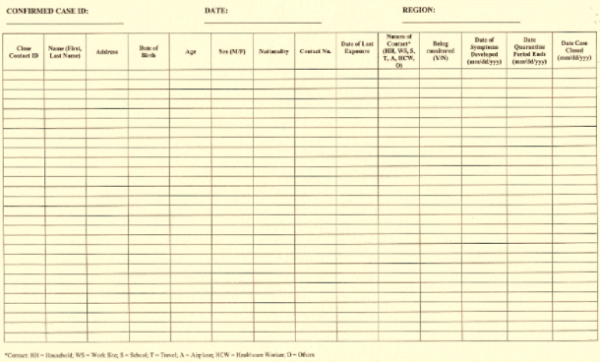
DOH Signs and Symptoms Log Form
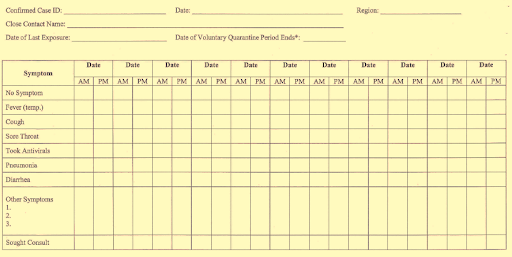
1. BACK TO WORK MEDICAL CLEARANCE PROCESS FOR EMPLOYEES
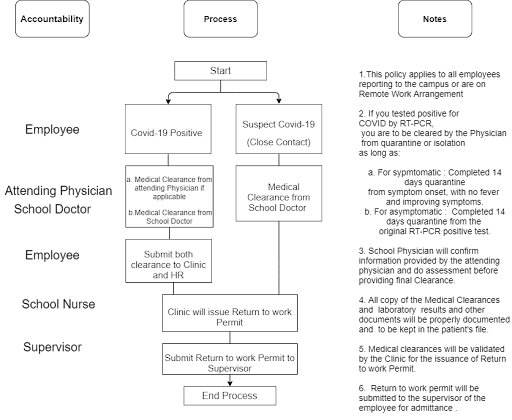
2. BACK TO CAMPUS MEDICAL CLEARANCE PROCESS FOR STUDENTS
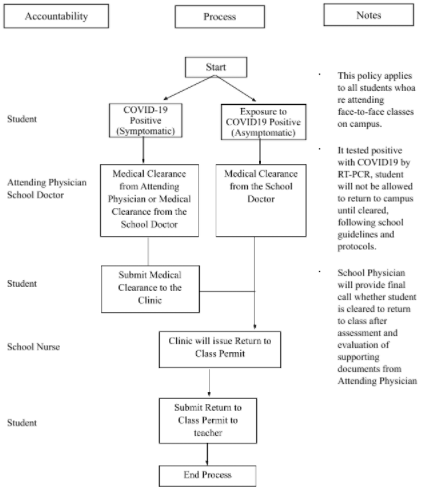
3. SCHOOL PHYSICIAN ONLINE CONSULTATION PROCESS
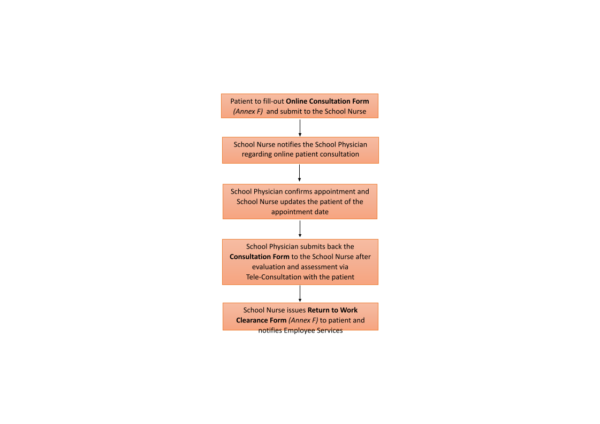
Discharge and Recovery Criteria Guideline: When do we consider COVID-19 patient to rejoin the Enderun Community
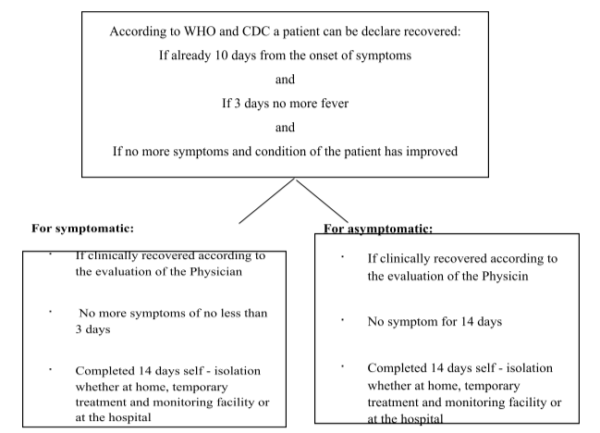
Note: Suspect, Probable, and Confirmed COVID-19 patients are not necessary to repeat RT-PCR swab test when declared as recovered because:
With expanded testing, we are using RT-PCR to detect the virus, but it also has the capability to detect small dead fragments of the virus inside the body of the patient. Virus can be infectious before and until onset of symptoms only. On the 7th day from the onset of symptoms, the virus becomes less likely to infect and will no longer be infectious from 10th day onwards. We only extend self-isolation until 14 days just to ensure COVID-19 patient is completely not infectious anymore.
APPENDIX G:
Emergency Transfer and Referral System Protocol for Covid-19 Suspects or Confirmed Cases
In case anyone exhibit Covid-19 symptoms, severe and critical conditions while inside Enderun Colleges, requiring transfer to St Luke’s Medical Center, the following steps are to be followed:
- While inside the School Clinic, the Clinic team will stabilize the patient’s condition.
- Clinic team will contact St Luke’s Medical Center, BGC. Communicate with the emergency transfer and receiving hospital regarding the patient’s condition and estimated time of arrival. (Tel # 8789-7700)
- Clinic team will coordinate with the Concierge in calling McKinley Response (Ambulance) – mobile # 09169303938
- Clinic team will contact the student’s parent or legal guardian, report the situation, and advise the parent or legal guardian to come to school or to St. Luke’s Medical Center, BGC.
- If no ambulance is available, the Clinic team will transport the patient in a private vehicle with all windows open and give the patient a medical mask prior to leaving the school.
- Secure informed consent from the patient or from the parent or legal guardian
- The School Nurse will accompany the patient. Wear a medical mask and perform proper hand hygiene during transport; observe the proper etiquette for sneezing and coughing and avoid unnecessary contact with the vehicle.
Safe transfer workflow for staff
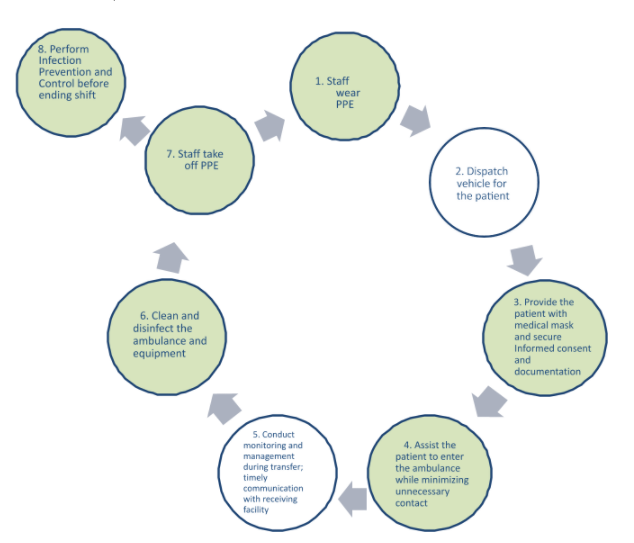
INFORMED CONSENT FOR EMERGENCY CARE
YOUR RIGHTS CONCERNING EMERGENCY CARE.
- You have the right to receive an appropriate medical screening examination within the capability of the Hospital to determine whether you have an emergency medical condition.
- If it is determined that an emergency medical condition exists, you have the right to receive treatment within the capability of the Hospital to stabilize the emergency medical condition or to receive an appropriate transfer to a medical facility to receive such treatment.
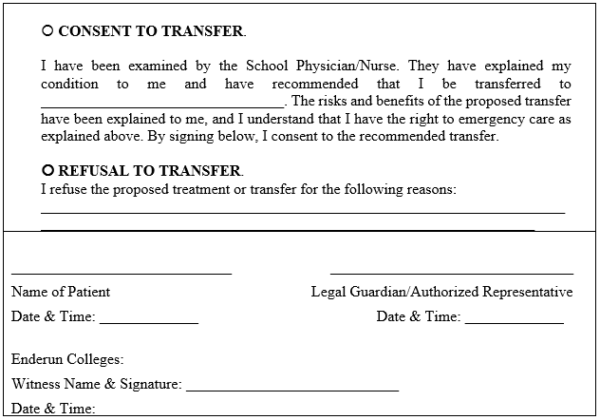
APPENDIX I:
Personal Protective Equipment ( PPE) Guideline
When providing care for anyone with suspected or confirmed SARS-CoV-2 infection, Isolation area personnel shall always wear the recommended PPEs prior to attending sick colleagues or students, as prescribed by the DOH department: Disposable gown, Face shield, medical grade mask and Gloves.
PPE is only effective if worn properly and must be inspected for defects every time it is put on. All used PPEs shall be properly disposed of after every use in the designated bin.
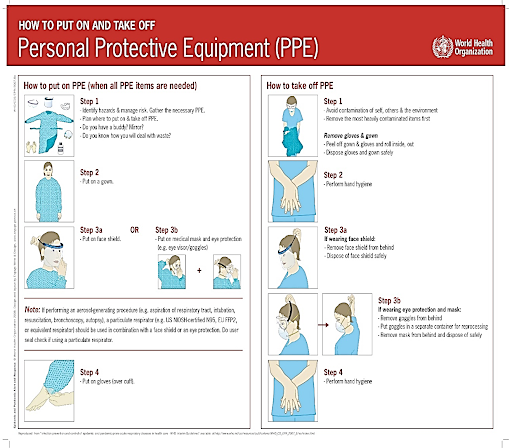
TOWN HALL MEETING ON THE GRADUAL RE-OPENING OF FACE-TO-FACE CLASSES (November 29, 2021)
Purpose of the Town Hall Meeting
The objective of the Town Hall Meeting is to consult the entire Enderun community on the main considerations in planning for a limited return to face-to-face classes. It also clarifies the primary constraints in planning, anticipating, and foreseeing answers to questions that may arise (with a preference to ensure transparency). At the same time, the event allows for a discussion about Enderun’s innovative hybrid class option and acquiring sufficient community support to put the plan into action.
Primary constraints and objectives:
- As of September 28, 2021, only BS in International Hospitality Management and other degree programs that require hands-on experience have been officially approved to start limited face-to-face classes in higher education institutions (HEIs) under Modified General Community Quarantine (MGCQ). However, we expect the other degree programs will soon also receive official permission.
- Government-required safety protocols must be met. In implementing government regulations, Enderun will consistently continue its own policy of optimal safety over risk. Accordingly, only fully-vaccinated students, faculty, and employees will be allowed on campus.
- Within these constraints, the plan should respond to student preference and suggestions as best as possible.
- The plan should provide desirable options for class attendance.
The plan’s innovative centerpiece is the hybrid class that will be attended simultaneously (synchronously) by a limited number of students who opt to participate in class at campus and the rest who will participate from home.
Enderun’s Efforts for a Covid Safe Campus and Community
- Hygiene and Sanitation
- Classrooms are arranged into Hybrid Set-Up. Digital tools and equipment such as smart TV, video cameras, and microphones are installed to accommodate students to join class virtually from home while the teacher and some students attend class in-person.
- COVID-19 safety graphics and signages has been in installed around campus, in classrooms, lounges, offices, and commonly used areas
- Alcohol/hand sanitizer dispensers are installed at entrances of each building
- Installation of clear acrylic sheets in the kitchen labs
- Classrooms are assessed for proper ventilations
- Vaccination Status
- Complete COVID-19 guidelines and policy to be published in various Enderun channels:
- Enderun website
- Enderun App COVID-19 Channel
- Videos and posters through electronic bulletin boards on campus
Enderun’s teaching and non-teaching staff have a vaccination rate of 98.2 percent, while students in the senior high school and college departments have an 81 percent vaccination rate.
CHED General Guidelines (CHED-DOH JMC No. 2021-001)
- Limited face-to-face classes are not mandatory.
- Allowed degrees for the limited face-to-face classes as of November 2021:
- BS International Hospitality Management
- Only aged 20 y/o above students will be allowed to take the limited face-to-face classes.
- Enderun Colleges will be applying for permits to conduct face-to-face classes for all other degree programs not identified and will still be subjected to actual audit after submission of necessary requirements.
CHED Requirements for the Limited Face-to-Face Classes
- Only fully vaccinated teaching and non-teaching personnel, and students are allowed to enter the campus.
- Students must submit a signed Consent Form to attend face-to-face.
- Students with or living with individuals with significant comorbidities of the risk of contracting COVID-19 shall be advised to consider flexible learning as to not risk the family member with compromised immune.
- Students allowed to attend limited face-to-face classes must submit a Philhealth form (MDR) or equivalent medical insurance that covers medical expenses related to COVID-19.
- Instructions on how to apply for Philhealth and/or individual medical insurance will be posted on the Enderun App COVID-19 Channel.
Note:
As per DOH, limited face-to-face or in-person classes for higher education shall be allowed to operate or be undertaken at a maximum of 30% indoor venue capacity for fully vaccinated individuals only for areas under Alert Level 3 provided that there is no objection from the LGU.
Source: https://doh.gov.ph/node/33589
Enderun Colleges’ Protocols During the Limited Face-to-Face Classes
- Accomplishing the health declaration form via QR code at the main entrance will be mandatory to everyone entering the campus.
- Fully vaccinated teaching and non-teaching personnel, and students must bring their vaccination card and present it upon entry at the campus.
- Wearing a face mask inside the campus, including inside classrooms, will be mandatory.
- Enderun classroom occupancy capacity implementing the 1.5 meter physical distancing.
- Students are encouraged to bring their own food and will not be allowed to leave the campus between classes to take a break.
- There will be an outdoor dining area at the Titans Yard with food kiosks.
- Each person shall only be permitted one entry and one exit per day.
- Care Kit will be issued to each student who will be attending the face-to-face classes.
- Daily maintenance, cleaning, sanitation, and disinfection of buildings, facilities, classrooms, offices, and commonly used spaces, among others or when anyone develops COVID-19 symptoms while in school premises.
- Parking slots will be allotted per student for free.
- Drivers of students will be asked to follow campus protocols including answering the health declaration form and wearing a face mask at all times.
- Uniform for students is the Wash Day shirts. Chef’s uniform for CA lab classes. Students may have the option to wear the Oxford wash day shirts and/or corporate uniform, if preferred.
Second Semester Class Schedule
The following are the subjects to be offered in hybrid mode (subject to change):
Period A
- Kitchen Essentials & Basic Food Preparation
- Kitchen Management
- F&B Craft Based Learning
- Advanced Culinary Arts
- Mediterranean Cuisine
- Good Governance and Social Responsibility
- Operations Management
- Statistics and Data Analytics
- Fundamentals in Food Service Operations
- Basic Microeconomics
- Public Economics
- Differential and Integral Calculus
- AVComm3: Graphics 3
- AVComm 4: Techniques 2
- Interior Design 2
- Interior Perspective
- Literature
- Art Appreciation
- Readings in Philippine History
Period B
- Kitchen Essentials & Basic Food Preparation
- Kitchen Management
- F&B Craft Based Learning
- Culinary Craft Based Learning
- Management Tools and Techniques
- Operations Management
- Fundamentals in Food Service Operations
- Basic Microeconomics
- Resource Economics
- Interior Design 4
- Computer Aided Design for ID 3
- Purposive Communication
- Science, Technology, and Society
- Elementary French
- Art Appreciation
- NSTP 1
Frequently Asked Questions
- If I want to be part of the students to join the hybrid classes, do I have to immediately join in January 2022? Or can I start hybrid classes sometime in February or March 2022 because I would still need to look for a place to stay and until then I can only be online?
At the start of the semester, the teachers of hybrid classes will discuss the schedule of face-to-face and determine if groupings will have to be made based on the # of students interested to go to the campus & the limited capacity of the rooms. Students who will do F2F will have a fixed schedule spread throughout the study period. Hence, you can come during your schedule. - What courses will be open during the hybrid classes?
We have the initial list of subjects/courses that will be offered in a hybrid setup. The priority is IHM subjects as prescribed by CHED. Currently however, the school is in the process of applying for permits to open other courses for the limited face-to-face. We’re hoping we could get this permit before the start of the 2nd sem. - I need to finish CA Lab classes, can I mix in subjects that can be done online as well?
Yes, as long as there are no conflicts in schedules of your other online subjects. The hybrid-ready classrooms have specific occupancy capacity and this will be strictly enforced to ensure physical distancing. Again, groupings can be discussed in the beginning of the study period to create shifting or rotation of students in-campus for face-to-face. - Will the students be taking turns for the hybrid sessions?
The rotation for F2F classes will be explained and agreed by the class in the beginning of the study period. - When face-to-face classes resume, will the college dormitory be opened for usage?
Yes, the College dormitory will be opened to students who are eligible to attend the limited face-to-face classes. The same school guidelines and protocols will strictly be implemented in the dorm. - If face to face is allowed, will athletics be allowed also?
Re-opening of collegiate athletic training is subject for approval of CHED. Enderun will also try to submit necessary requirements to be permitted for a ‘Bubble Training’
Requirements for the Limited Face-to-Face Classes on Campus
- Fill-up the Student Requirements for Face-to-Face Classes.
- While filling out the form, you will be asked to insert the following files/requirements:
- Signed Waiver and Consent to Attend F2F Classes Form: Waiver and Consent Form
- Vaccination Card/Certificate of Vaccination
- PhilHealth Insurance or Personal Medical Insurance with COVID-19 Medical Coverage: How to Apply for PhilHealth/Medical Insurance

